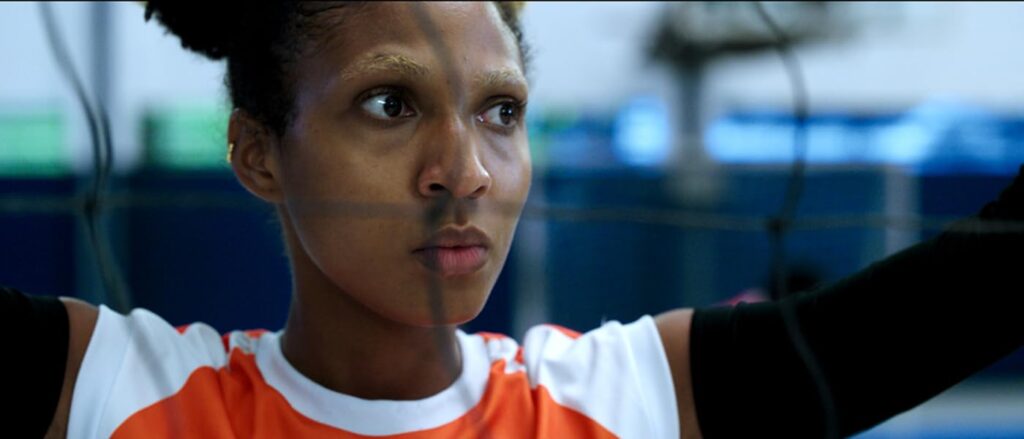Power Alley – BFI London Film Festival Review

Sofia (Ayomi Domenica Dias) is the star player on her high-school volleyball team, under pressure to help them win the championships. A scout is floating around, ready to offer the 17-year-old an international scholarship, and a glittering future.
Then she discovers that she’s pregnant.
Whilst she knows she doesn’t want the baby, in Brazil – where Power Alley is set – abortion is illegal. Sofia finds a clinic that seems like it might be able to offer a solution, but it turns out to be a trick by local far-right extremists to get the details of desperate girls and women in order to cajole and then threaten them into continuing their pregnancies. Thanks to her deceased mother’s Uruguayan citizenship, she may be able to get a legal procedure there, but that will mean telling (and devastating) her father (Rômulo Braga), as well as finding a lot of money that she does not have. There are no good options, the clock is ticking – and she is still determined to win that vital volleyball game for her beloved teammates.
It’s the love between her and her teammates that gives Power Alley its enormous heart, and stops the dire circumstances in which Sofia finds herself making this film a misery-fest; because however depressing and infuriating her situation is, this is not a depressing movie. The members of the C. Leste volleyball team are a group of nonbinary and female-identifying athletes who adore each other. However dauntingly overwhelming the conservatism of Brazilian society may be, the strength of their bond is a powerful force; as soon as they learn of Sofia’s predicament, they are all entirely committed to doing whatever they need to do to help her. So rather than miserabilist social realism presiding over Lillah Halla’s feature directorial debut, it’s the joyful defiance of Sofia’s team that becomes Power Alley’s resounding theme.

Another theme, or perhaps trait would be more accurate a description, is chaos. Halla’s is a rowdy film, big and vibrant and unwieldy, and sometimes it doesn’t feel as though she quite has a handle on the many moving parts; for one thing, Sofia’s burgeoning romance with teammate Bel (Loro Bardot) isn’t really given enough air amidst the hustle and bustle. Some of the strongest scenes are the rare quieter moments between Sofia and her dad, as the latter tries to fight his way past his confusion and conservative leanings to get to a place where he can be there for his daughter. The moments between the two of them are so finely drawn – heavy with the weight of the loss of Sofia’s mother, which is barely discussed, but deeply felt – it’s a little disappointing we don’t get more of them. Instead, Halla’s inclination towards the loud sometimes risks drowning these moments out; the big climactic showdown is so melodramatic, it teeters right on the edge of cartoonishness.
Still, given the dystopian environment those in Sofia’s position are up against, this raucous urgency is perhaps the only fitting reaction. However messy it might get, more than anything else, Power Alley’s gleeful rebellion against the policing of female and non-binary bodies is timely, heartfelt, and empowering.
★★★★


